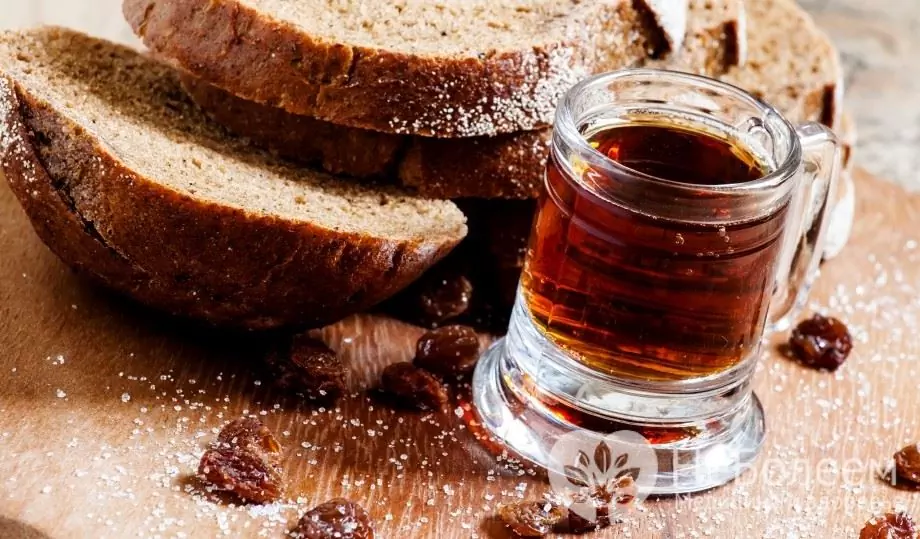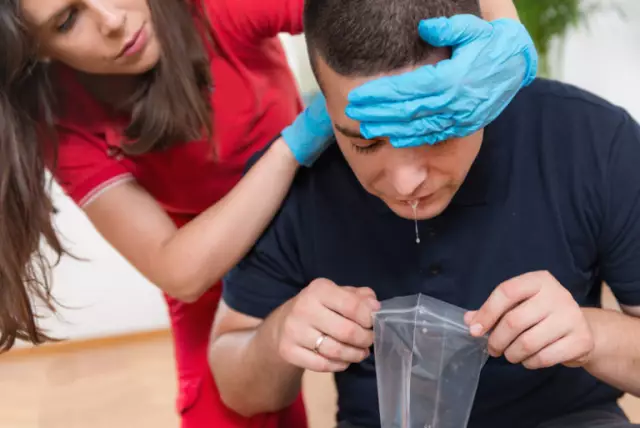- Author Rachel Wainwright wainwright@abchealthonline.com.
- Public 2023-12-15 07:39.
- Last modified 2025-11-02 20:14.
Kvass poisoning
Kvass is a traditional Slavic drink, the first mentions of which date back to the 8-9 centuries (by the 15th century in Russia there were more than 500 varieties of kvass), although a recipe similar to kvass in composition and method of preparation was known in ancient Egypt.

Source: depositphotos.com
The drink is made using incomplete lactic acid and alcoholic fermentation of kvass wort. Sometimes spicy herbs, honey, fruit and berry concentrates (cherry, pear, lemon, mint, cranberry kvass, etc.) are added to kvass.
Despite the fact that kvass belongs to non-alcoholic beverages, according to GOST, the ethyl alcohol content in it can reach 1.2% in terms of anhydrous alcohol, but there are varieties where the alcohol content exceeds 2.5%.
Due to the extraordinary chemical composition (vitamins of groups B, PP, E, lactic, carbonic and acetic acid), kvass has a positive effect on the cardiovascular and nervous system, increases the rate of metabolic processes, has a high energy intensity, and stimulates the digestive tract.
On sale you can find pasteurized kvass (packaged in factory containers) or unpasteurized (draft). An unpasteurized drink is usually stored for no more than 3 days; pasteurized kvass is able to maintain freshness for up to 6 months in a sealed bottle.
In addition to natural kvass, synthetic kvass drinks made without the use of kvass wort have become widespread. They are made from water, simulated flavors, sweeteners and colors and are artificially carbonated. This drink has no useful properties, the carbohydrate content in it is several times higher than in natural kvass.
How does kvass poisoning happen?
More often, kvass poisoning occurs when:
- expiration date;
- violation of storage standards;
- violation of the requirements for the sale of the drink.
The likelihood of kvass poisoning is higher when drinking a draft drink purchased at a mobile outlet. According to the technical and sanitary requirements for the sale of such kvass, the shelf life should not exceed several days, usually 2-3. The relevant information is contained in the accompanying documentation from the seller and is set by the manufacturer individually, depending on the specifics of production.
After the stated period of time, bacteria begin to multiply in the drink, which can cause food poisoning.
The source of pathogenic microorganisms can also be the barrel itself, in which kvass is transported and stored, if its inner surface is not thoroughly cleaned when pouring a new batch of drink. The container into which the kvass is poured during the sale must be disposable.
You can also get poisoned with kvass in its original packaging, purchased in a store, if the drink was stored and transported in violation of the relevant standards or after the expiration date.
Poisoning symptoms
Symptoms are typical of food poisoning:
- rapid onset of the disease 2-6 hours after drinking the drink;
- increased body temperature of varying severity;
- general symptoms of intoxication (headache, dizziness, weakness, lack of appetite, drowsiness);
- nausea, vomiting;
- pain in the abdomen;
- bloating;
- repeated loose stools.

Source: depositphotos.com
First aid for kvass poisoning
- Gastric lavage with 0.5-1.5 liters of warm water or a light pink solution of potassium permanganate, for which it is necessary to drink liquid and, by pressing on the root of the tongue, provoke an emetic urge. The procedure should be repeated until clean wash water.
- Reception of enterosorbents (activated carbon, Enterosgel, Polyphepan, Polysorb, Laktofiltrum, etc.).
- Taking saline laxatives (magnesium sulfate) in the absence of diarrhea.
- Replenishment of fluid lost with loose stools and vomiting (saline solutions (Rehydron, Hydrovit, Oralit) or salt-free (tea without sugar, water, rosehip decoction) in order to prevent dehydration, up to 2-2.5 liters per day for adults.
Taking antiemetic and antidiarrheal drugs, antibiotics, antimicrobial and antiviral drugs, dietary supplements, alternative medicine (tinctures, infusions, decoctions) without a doctor's recommendation is prohibited.
When is medical attention required?
Qualified assistance is needed if:
- the activities carried out do not bring relief or against their background there is a deterioration in well-being;
- the increase in body temperature is persistent, uncontrollable;
- neurological symptoms appeared (intense headache, discoordination, visual or speech disorders, convulsions);
- there are traces of blood in the vomit or feces;
- symptoms of dehydration have developed (dry mouth, decreased blood pressure, a sharp decrease in urination, urine has become concentrated, with a pungent odor);
- vomiting or diarrhea becomes uncontrollable;
- a child, elderly person or pregnant woman is injured.
Possible consequences
In the case of mild kvass poisoning, the symptoms stop within 1-2 days, the state of health is completely normalized, there are no complications.
In case of moderate and severe poisoning, signs of digestive upset persist for up to 5-7 days, complications from both the gastrointestinal tract and other organs and systems are possible, in particular, reactive damage to the pancreas, diseases of the hepatobiliary zone, urinary system. After the postponed poisoning, chronic diseases can be complicated.
The most common complication is intestinal dysfunction, dysbiosis.
In the recovery period, the victim must adhere to a strict diet, eat fractionally, refuse to use seasonings, spices, fried, spicy and salty foods.
Prevention
In order to prevent kvass poisoning, you must remember:
- sediment is unacceptable in bottled kvass;
- the container should be made of dark plastic or glass;
- the expiration date on the label must be clearly legible;
- when buying draft kvass, you must make sure that you have the accompanying documentation, which indicates the shelf life;
- kvass is poured from a barrel or keg only into a disposable container.
An open bottle of kvass must be stored in the refrigerator for no longer than 3 days.
YouTube video related to the article:

Olesya Smolnyakova Therapy, clinical pharmacology and pharmacotherapy About the author
Education: higher, 2004 (GOU VPO "Kursk State Medical University"), specialty "General Medicine", qualification "Doctor". 2008-2012 - Postgraduate student of the Department of Clinical Pharmacology, KSMU, Candidate of Medical Sciences (2013, specialty "Pharmacology, Clinical Pharmacology"). 2014-2015 - professional retraining, specialty "Management in education", FSBEI HPE "KSU".
The information is generalized and provided for informational purposes only. At the first sign of illness, see your doctor. Self-medication is hazardous to health!






